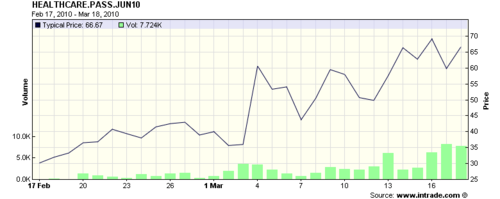As discussed below, the CBO scoring on the House health care bill is a god-send for reform advocates, making many Democrats in the House "giddy". Ezra Klein asks the right question: given the excellent report (which the GOP is still struggling to countermand), won't it be difficult for wavering House Democrats to vote "no"?
Won't it be substantively difficult for many House Democrats to vote no?
If you're a liberal House Democrat, here's what you'd be voting against: Legislation that covers 32 million people. A world in which 95 percent of all non-elderly, legal residents have health-care coverage. An end to insurers rescinding coverage for the sick, or discriminating based on preexisting conditions, or spending 30 cents of each premium dollar on things that aren't medical care. Exchanges where insurers who want to jack up premiums will have to publicly explain their reason, where regulators will be able to toss them out based on bad behavior, and where consumers will be able to publicly rate them. Hundreds of billions of dollars in subsidies to help lower-income Americans afford health-care insurance. The final closure of the Medicare Prescription Drug Benefit's "doughnut hole."
If you're a conservative House Democrat, then probably you support many of those policies, too. But you also get the single most ambitious effort the government has ever made to control costs in the health-care sector. According to the Congressional Budget Office, the bill cuts deficits by $130 billion in the first 10 years, and up to $1.2 trillion in the second 10 years. The excise tax is now indexed to inflation, rather than inflation plus one percentage point, and the subsidies grow more slowly over time. So one of the strongest cost controls just got stronger, and the automatic spending growth slowed. And then there are all the other cost controls in the bill: The Medicare Commission, which makes entitlement reform much more possible. The programs to begin paying doctors and hospitals for care rather than volume. The competitive insurance market.
Perhaps the only thing a conservative might still object to is abortion funding, although that cow has been beaten dead. The Hyde Amendment already prevents federal spending on abortion, and the language in the bill only reiterates that.
On the prediction markets, health care reform passage (before June 30) has risen to almost 80% (it was in the 30% area a month ago):


